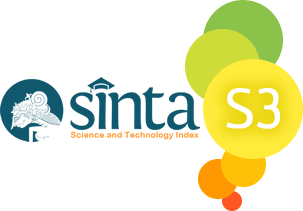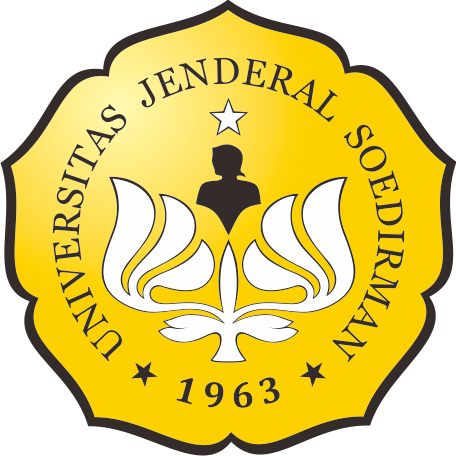CHARACTERIZATION OF 18S RIBOSOMAL RNA FRAGMENT FROM Solanum tuberosum L. var. Granola POTATO
Abstract
Potato (Solanum tuberosum L.) is a prime horticultural commodity. One of the varieties of potato that widely cultivated in Indonesia is Granola. This study characterized the variety Granola based on the 18S sequences of rRNA gene fragment. The 18S sequences were used to distinguish the Granola and determine the differentiating characters from other Solanum based on those sequences data. The characterization was completed in three main steps including DNA isolation from potato leaf using Doyle & Doyle method, amplification of the 18S gene fragment, and DNA sequencing. The amplification of 18S gene fragment by a PCR method obtained 528 bp sequences. The BLAST search using NCBI web service confirmed that Granola potato has 99% matching sequence with S. tuberosum. The phylogenetic reconstruction further indicates the S. tuberosum var. Granola used in this study deeply nested with the reference sequence X67238.1, a potato from Europe.
Keywords
Full Text:
PDFReferences
Badan Ketahanan Pangan Kementrian Pertanian. 2013. Roadmap Diversivikasi Pangan 2011–2015. Jakarta: Kementrian Pertanian. 58–70 p.
Devereux R, Wilkinson SS. 2004. Amplification of Ribosomal RNA Sequences. Netherlands: Kluwer Academic Publisher, 509–522 p.
Dharmayanti NLPI. 2011. Filogenetika Molekuler: Metode Taksonomi Organisme Berdasarkan Sejarah Evolusi. Wartazoa, 21(1):1–10.
Felsenstein J. 1985. Confidence limits on phylogenies: an approach using the bootstrap. Evolution, 39:783–791. https://doi.org/10.1111/j.1558-5646.1985.tb00420.x
Handoyo D, Rudiretna A. 2001. Prinsip Umum dan Pelaksanaan Polimerease Chain Reaction (PCR). Unitas 9(1):17–29.
Kawengian YB, Lengkong E, Mandang J. 2016. Keragaman Genetik Beberapa Varietas Kentang (Solanumtuberosum L.) Berdasarkan Penanda Random Amplified Polimorphic DNA (RAPD). Bioslogos. 6 (2):60–67.
Khosravinia H, Murthy HNN, Parasad DT, Pirany N. 2007. Optimizing Factors Influencing DNA Extraction from Fresh Whole Avian Blood. African Journal of Biotechnology. 6 (4):481–486.
Kusmana, Basuki RS. 2004. Produksi dan mutu umbi klon kentang dan kesesuaiannya sebagai bahan baku kentang goreng dan kripik kentang. Jurnal Hortikultura. 14(2):246–252.
Lodhi MA, Ye GN, Weeden NF, Reisch BI. 1994. A simple and efficient method for DNA extraction from grapevine cultivars and Vitis species. Plant Molecular Biology Reporter. 12(1):6–13. https://doi.org/10.1007/BF02668658
Muzuni, Adi DA, Syarif S. 2014. Karakterisasi Fragmen Gen 18s rRNA Pokea (Batissa Violacea Celebensis Martens, 1897) di Sungai Pohara Kecamatan Sampara Kabupaten Konawe. Biowallacea 1 (1):25–38.
Runtunuwu DS, Rogi JEX, Palendeng JH. 2011. Identifikasi Varietas Kentang “Superjohn” berdasarkan Penanda RAPD (Random Amplified Polymorphic DNA). Eugenia 17(1):52–59.
Sambrook J, Fritsch EF, Maniatis, T. 1989. Molecular Cloning: A Laboratory Manual. New York:Cold Spring Harbor Laboratory Press. 113–127 p.
Sutarno, Setyawan AD. 2015. Biodiversitas Indonesia: Penurunan dan upaya pengelolaan untuk menjamin kemandirian bangsa. Pros Sem Nas Masy Biodiv Indo. 1(1):1–13. https://doi.org/10.13057/psnmbi/m010101
Suwanto A. 2011. Keanekaragaman Hayati Mikroorganisme. Bogor:IPB. 14–46 p.
Williams CN, Uzo JO, Peregrine WTH. 1993. Vegetable production in the tropics. London:Longman group UK limited. 374 p.
Article Reads
Total: 2058 Abstract: 1330 PDF: 728Refbacks

This work is licensed under a Creative Commons Attribution-ShareAlike 4.0 International License.
This website is maintained by:
Bio Publisher
The Faculty of Biology Publishing
Faculty of Biology
Universitas Jenderal Soedirman
Jalan dr. Suparno 63 Grendeng
Purwokerto 53122
Telephone: +62-281-625865
Email: biologi@unsoed.ac.id
T his website uses:
OJS | Open Journal System
A free journal management and publishing system that has been developed by the PKP (Public Knowledge Project) version 2.4.8.0.
All article content metadata are registered to:
Crossref
An official nonprofit Registration Agency of the International Digital Object Identifier (DOI) Foundation.
Articles in this journal are indexed by:









